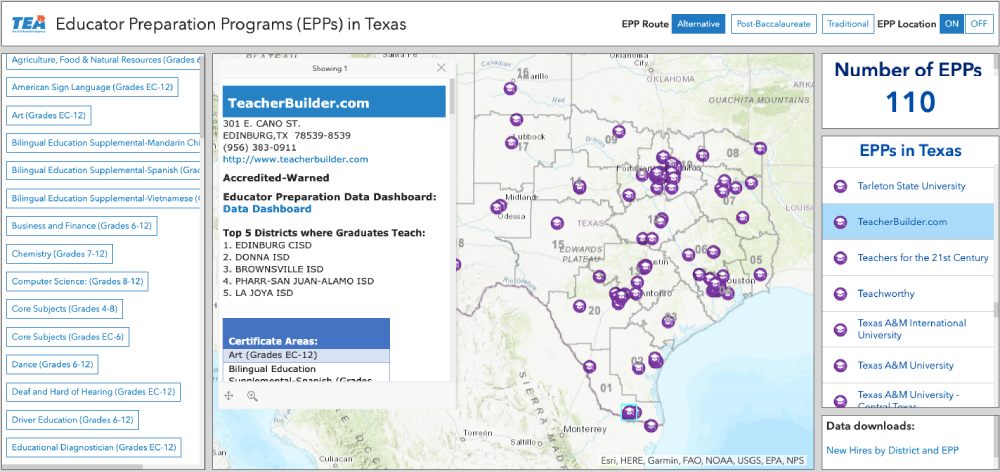09.21.2020
How to Get Alternative Teaching Certification in Texas

All future educators who do not possess traditional teaching are always asking around one common question – how to get an alternative teaching certification in Texas. Alternative Teaching Certification (ATC) is meant for those who wish to teach in Texas schools but have not completed any educator preparation program. In order words, they do not possess state-accredited certificates required for teaching. The certification also applies to those who have graduated in subjects other than Education.
These nontraditional certifications follow the standards set by the Texas Education Agency and include pre-service coursework or training before candidates can begin to teach in a primary or secondary classroom. Many of the state-approved alternative certification programs are two-semester long and include an internship.
10 Steps to become a teacher in Texas
Follow the 10 steps listed below to become eligible for classroom teaching in Texas by means of Alternative Teaching Certification:
1. Determine what you wish to teach and to whom
The first step to selecting a nontraditional program is to decide the subject you want to teach and the grade you are aiming for. Certification programs are available for all grades and subject areas.
Approved Certification areas:
| Agriculture, Food & Natural Resources 6-12 | Early Childhood PK-3 | Languages Other Than English – Arabic EC-12 | Life Science 7-12 |
School Librarian EC-12
|
| American Sign Language EC-12 | Educational Diagnostician EC-12 | Languages Other Than English – French EC-12 | Marketing 6-12 | Science 4-8 |
| Art EC-12 | English Language Arts and Reading 4-8 | Languages Other Than English – German EC-12 | Mathematics 4-8 | Science 7-12 |
| Bilingual Education Supplemental-Mandarin Chinese NA | English Language Arts and Reading 7-12 | Languages Other Than English – Hindi EC-12 | Mathematics 7-12 |
Social Studies 4-8
|
| Bilingual Education Supplemental-Spanish NA | English Language Arts and Reading/Social Studies 4-8 | Languages Other Than English – Italian EC-12 | Mathematics/Physical Science/Engineering 6-12 |
Social Studies 7-12
|
| Bilingual Education Supplemental-Vietnamese NA | English as a Second Language Supplemental NA | Languages Other Than English – Japanese EC-12 | Mathematics/Science 4-8 |
Special Education EC-12
|
| Business and Finance 6-12 | Family and Consumer Sciences 6-12 | Languages Other Than English – Korean EC-12 | Music EC-12 |
Special Education Supplemental NA
|
| Chemistry 7-12 | Gifted and Talented Supplemental NA | Languages Other Than English – Latin EC-12 | Physical Education EC-12 | Speech 7-12 |
| Computer Science 8-12 | Health EC-12 | Languages Other Than English – Mandarin Chinese EC-12 | Physical Science 6-12 |
Superintendent EC-12
|
| Core Subjects 4-8 | Health Science 6-12 | Languages Other Than English – Russian EC-12 | Physics/Mathematics 7-12 |
Teacher of Students with Visual Impairments EC-12
|
| Core Subjects EC-6 | History 7-12 | Languages Other Than English – Spanish EC-12 | Principal as Instructional Leader EC-12 |
Technology Applications EC-12
|
| Dance 6-12 | Hospitality, Nutrition and Food Sciences 8-12 | Languages Other Than English – Turkish EC-12 | Reading Specialist EC-12 |
Technology Education 6-12
|
| Deaf and Hard of Hearing EC-12 | Human Development and Family Studies 8-12 | Languages Other Than English – Urdu EC-12 | Reserve Officer Training Corps (ROTC) 6-12 | Theatre EC-12 |
| Driver Education 6-12 | Journalism 7-12 | Languages Other Than English – Vietnamese EC-12 | School Counselor EC-12 |
Trade and Industrial Education 6-12
|
Once you have determined the area and grade levels, you can begin searching for appropriate programs, the schools that provide them, and finally the certification exams you would need to take to begin teaching. Alternative programs are provided accredited education centers, community colleges, school districts, universities, and private institutions
Your choices are influenced by your subject matter knowledge and interests, your degree level, and whether you like teaching young children, teens, or older students.
2. Pick the Alternative Certification Program suitable for you
Educator programs are usually completed in 12 months or 2 successive semesters. Most of the time, there is an opportunity for candidates to work as paid interns in district schools where they are supervised by the competent authority. However, internships without payment also exist where future educators undergo clinical experiences.
3. Pass the conditions set for enrolling to the program
There are a few state-recommended criteria for admission to the program of your choice. Each program also comes with its own set of norms. In most cases, these are related to your Grade Point Average (GPA) and subject matter expertise.
4. Build a course plan with your program to get certified
Once you have been accepted to the program, the staff will discuss a course of action for you towards certification. The experienced staff would be able to tell you how to get an alternative teaching certification by following a well-laid plan. They would inform you of the exact training course you need, the internships available to you, and the tests you have to take at the end of the coursework. In addition, they would also let you know of related training norms that you must meet.
The cost of these programs is variable. In addition to tuition charges of the program and accompanying study material, candidates are required to pay for examination and certification purposes as stated by the state testing agency. Independent agencies might be responsible for running background checks on you and things such as fingerprinting are not carried out by ACPs. Applicants must make a thorough inquiry before admission to prevent confusion at the time of issuing certificates.
5. Acquire a teaching job
The next thing to do is getting hired as a teacher with the help of your program provider. Once you have met certain training requisites and progressed through the course, the provider is likely to issue a recommendation. With this document in hand, you are required to get selected for a teaching position at a school to gain hands-on teaching experience in a real classroom.
The subject matter and grade you are assigned to teach must be the same as the ones you have selected for your ACP. You would be mentored by a certified supervisor during your teaching sessions.
6. Obtain Probationary Certificate
As a yet non certified educator, you must obtain a Probationary Certificate online from the state education authority. This will help you complete the teaching assignment mentioned in your Alternative Teaching Certification Texas program. The certificate is valid for 12 months from the date of issue.
Your program must recommend you for the certificate. There may be background checks carried out before you are awarded the certificate.
7. Meet all the requirements of the ACP
A candidate must fulfill all that is asked in the non-traditional certificate program within one year. This includes training hours and tests, internships, and related activities.
8. Extension of Probation
If you are unable to meet the program requirements, you may have to lengthen the validity of your probation. This is only possible if you are eligible for an extension. No candidate can continue teaching in a Texas school with temporary certificates beyond three consecutive years before you receive your first certificate.
9. Obtain a formal teaching certificate
You are almost there. After the program provider deems it fit that you have met all program needs and are ready for a formal qualification, they recommend the same to the certifying authority online. For this, you will need to attempt the same exams that traditional certificate holders take, for instance, exams on content areas and Educator Standards also known as TExES. If you are successful, you are awarded an educator certificate, valid throughout Texas.
Candidates are notified via email as soon as their request for certification is approved and you are officially a licensed teacher in the state.
10. Start teaching
Finally, it is time to obtain a teaching position with an elementary, middle, or secondary school and start your teaching career.
Requirements for Alternative Teaching Certification
There are 3 simple requirements for getting into an ACP of your choice:
- You must possess a bachelor’s degree. Those who do not have a bachelor’s degree in Education are also eligible for ACPs.
- It must have been awarded by a recognized college or university
- You must pass an enrollment test if you do not meet certain criteria as set by the program
Approved programs
There are around 110 approved ACP providers in Texas. A complete list is uploaded on the Texas Education Agency website. The structure of the training and coursework hours as well as subject areas often vary from one provider to another but they all operate within the stipulations laid by the TEA.
The program you select must be accredited by the testing agency and have a proven track record of certified teachers. Some of these programs are designed and run by former teachers, some by administrators or test experts who know what the classroom environment demands of newly-qualified teachers.
Subject Areas
Future educators can opt for certification across all grades – Elementary, Middle School, and High School. Some of the available subject areas are listed below:
- English Language Art and Reading
- Mathematics
- Science
- Physical Science
- Life Science
- Social Studies
Special Education as a subject matter is available for all grades.
One can avail of certifications in Bilingual Education (Spanish) and English as a Second Language (ESL). These two, though, are not individual certificates and are to be opted for as additions.
However, not all courses are offered by all Programs. Check with program coordinators for more details. You can also check out the TEA website which links forward to programs in Texas. These have useful details like the available content areas by grade, the districts where their teachers are working, and the state of their accreditation as well as their contact information.
Technical Education
If you are a technical education teacher and wondering how to get an alternative teaching certification in Texas, let it suffice to know that you have to follow the same route – enroll in an ACP as per your choice of subject and grade, get a probationary certificate, complete the training, teach in a school with temporary certificates, take educator exams and apply for a standard, recognized initial qualification.
However, for technical and career educators, certification is subject to a few other conditions. For instance, educators for Health Sciences (Grades 6 – 12), need two years’ paid position along with advanced degrees to be eligible for educator certification. Similarly, for Trade and Industrial Education (Grades 6 – 12), one needs to have two to five years of professional experience, a valid license from a state-recognized licensing authority, and postgraduate qualifications. A cosmetologist must possess a practicing permit. For armed forces veterans, military years are counted as an alternative to civil practice.
When enrolling at a program, candidates must check for their eligibility and note any other requirements that they have to complete outside of training by the Program.
Conclusion
For obtaining an Alternative Teaching Qualification, Texas provides candidates with many accredited program centers that impart educator training in keeping with state guidelines. With a nontraditional certificate under your belt, you are treated at par with EPP certificate holders and should not find it difficult to build a fulfilling teaching career in Texas.
Disclaimer
This article does not contain legal, educational, or government advice. As regulations can change from time to time, readers are advised to check with their local education departments to receive up-to-date information.






